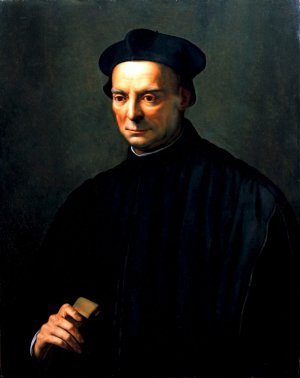Niccolò Machiavelli
Synopsis of The Mandrake
Machiavelli, born in Florence in 1469, is one of the most misunderstood personalities in history due to the term “machiavellian,” implying any means is justified to achieve the desired end. What we identify with being calculating and manipulative is in fact, in his words, “intellectual honesty to bear on the realities of politics.”
He never held a high position though he was responsible for the delicate diplomatic transactions to keep Florence from being attacked, and was given the job as official historian of Florence. Machiavelli was a purist whose ambition was to keep his city safe and crime free. He was initially attracted to the domincan friar Savonarola but later distanced himself.
Florence's unprecedented prosperity was a constant temptation for other city-states (such as Venice and Genova) as well as neighboring countries. For a fee they could rent an army from the Swiss and it was wiser and cheaper to bribe rather than fight. Machiavelli would accompany the ambassadors and while they dined with the enemy he'd be in his room writing the contract.
He was master in the diplomatic tango necessary to maintain stability yet was paid the salary of a civil servant. In one letter to his superiors he complained his coat was worn at the cuffs, and did not look well in meetings.

The Mandrake
(La Mandragola)
Callimaco, a young Florentine who lives in Paris, overhears a fellow countryman speak of Lucrezia, a woman of great beauty, back home. He returns to Florence to see for himself and immediately desires her. There are two obstacles. She has a husband, and she is virtuous. The young man enlists Ligurio, a hustler who knows the couple, who concocts a plan.
Callimaco will meet with Lucrezia’s husband Nicia disguised as a doctor. Nicia is a pompous sod who desperately wants an heir. Callimaco tells him to give his wife a tea with mandrake root so she can become pregnant. But he must be careful, the first man to sleep with her is doomed to die the day after. Nicia agrees and gives Callimaco money to buy the root.
Ligurio and Callimaco then pay a visit to Friar Timoteo, Lucrezia’s confessor. They bribe him (with Nicia’s money) to convince Lucrezia to take the potion and sleep with another man. Lucrezia is filled with doubt but, between her confessor and her mother she accepts as God's will.
According to plan Nicia abducts a young man that night (Callimaco disguised), brings him to the house and puts him to bed with Lucrezia. The next morning she is told the whole story. She and Callimaco become lovers.
While providing comic entertainment Machiavelli's satires reflect his political and social views. His style helped transform European theater, in particular playwrights of the Elizabethan era.
The underlying theme is fraudulance. Even Lucrezia, initially the only innocent and virtuous of the lot, turned to trickery after she saw how dumb her husband was to be conned like that. The most cynical of them all is Friar Timoteo, the last to leave the stage.
In 1513 Machiavelli was unjustly accused of an attempt to depose the de' Medici family from power. He was tortured, imprisoned and finally exiled to his home in the country. As it happened with Dante, his important works were written after he left public office.
In his book The Prince, which advanced his political theories, he wrote, “I have thought it proper to represent things as they are in real truth, rather than as they are imagined.” Rather than using Latin he chose to write in vernacular, which had become increasingly popular since the publication of Dante's Divine Comedy. If the means he describes in his book were not particularly moral he was not discussing morality, but reality. From his observations he transmitted what he saw and used the notorious Cesare Borgia, son of Pope Alexander VI, as an example.
Cesare Borgia was an excellent administrator but a man with no ethics, morals or conscience who would go to any length to gain power. He forced his sister Lucretia to marry a man she ended up loving, and had him assassinated. He almost died after he drank poisoned wine intended for a guest and cured himself by crawling into a horse’s fresh cadaver to sweat out the toxins. While he was in this state his opponents moved to regain control of the regions he had overtaken only to find that most citizens preferred Cesare as governor.
Machiavelli, in his treatise Art of War (Dell'arte della Guerra) used socratic dialogue, a method of questioning, to underline his theory on military tactics. The dialogue takes place in a garden in Florence where nobles, scholars and humanists gathered in the late 1400s. The pace is set by the marquise Fabrizio Colonna: Reward virtue, have empathy for the poor, respect military discipline, strive for public over personal welfare and force people to live in harmony. He believed a stronger defense is one where the soldiers are invested in their city rather than hire armies or mercenaries that could not be trusted.
Life in exile was hard on a man used to being in the center of things. He was morally disenchanted when he wrote The Mandrake, a satire dripping with cynicism. The performance was immediately popular in Florence and in Venice.